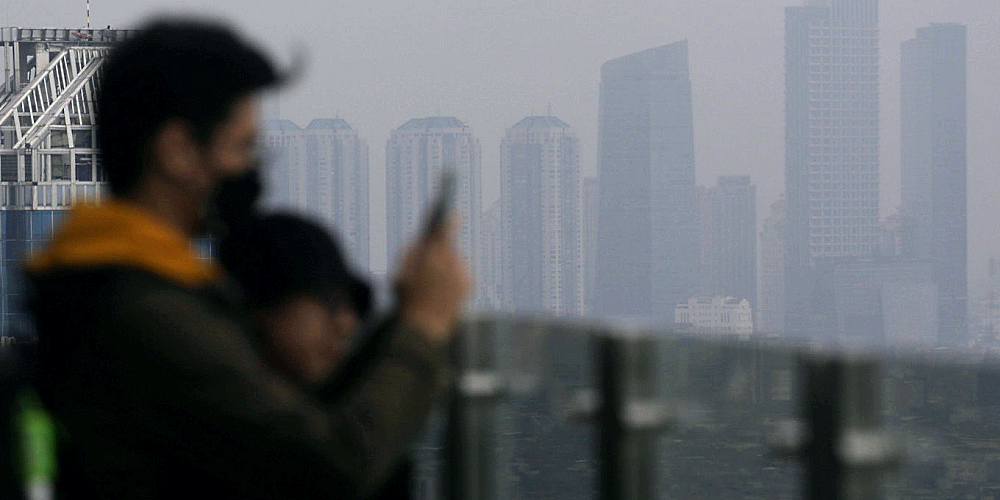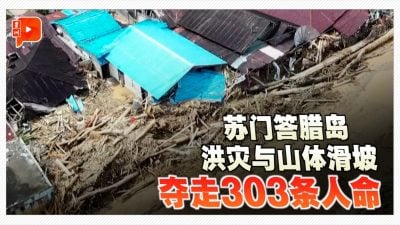The Jakarta administration will impose remote working for city employees and learning for students ahead of the Asean Summit in September, a move aimed to curb the severe air pollution that has been choking the city in recent months.
Jakarta has consistently ranked among the ten most polluted cities globally since May, according to the data compiled by Swiss air quality technology company IQAir. Authorities have largely blamed the worsening air pollution on the prolonged dry season, which exacerbates pollution from motorized vehicles and industrial activities.
The city will start imposing the remote working policy for 50 percent of its employees next week until Oct. 21, said acting Jakarta Communication, Information and Statistics Agency head Sigit Wijatmoko.
“The arrangement will only apply to employees who don’t serve the public directly,” Sigit said on Wednesday.
“We’ll make sure the remote working system won’t affect public services.”
The city employs around 200,000 people, of whom 30 percent are civil servants.
The remote working policy will then be expanded to 75 percent of city officials whose workplaces are in the vicinity of the Asean Summit venue, Sigit added. The summit is scheduled for September 5 to 7 at the Jakarta Convention Centre in South Jakarta.
The city would also order schools located around the summit venue to implement remote learning for 50 percent of their students during the bloc’s high-level meeting. Schools located around the Thamrin-Sudirman area and Menteng in Central Jakarta, as well as Kuningan in South Jakarta, would be affected by this policy.
“Students may fully return to schools once the summit is over,” Sigit said.

More emission tests
Aside from remote working and learning, the Jakarta administration is also working with the central government to ramp up efforts to control vehicle emissions in the city.
The Environment and Forestry Ministry carried out on Thursday emissions tests on all employees’ vehicles. The ministry will extend this test to every vehicle entering the ministry’s office in South Jakarta.
Earlier this week, Environment and Forestry Ministry Siti Nurbaya Bakar announced that the Jakarta Police would carry out random checks on vehicles running in the capital. Should the vehicle fail, or be found to not have undergone the emissions test, police officers will fine the driver.
The government is also planning to require an emissions test as part of the process of obtaining a vehicle registration license, the minister added.
Jakarta has more than 24.5 million vehicles traveling its roads, with millions more commuting from nearby satellite cities every day.
Research from 2019 by the Jakarta Environment Agency and Vital Strategies found that motorized vehicular emissions were the largest source of pollution in the capital, contributing to up to 57 percent of the pollution during the dry season.
To curb this source of pollution, Jakarta has since 2020 required owners of motorized vehicles more than three years old to perform an annual emissions test. But only up to 10 percent of all vehicles in Jakarta have taken the test due to a lackluster imposition of the punishment.
Authorities of satellite cities do not have similar regulations, although every vehicle travelling to, in or through Jakarta is subject to the city’s mandatory emissions testing rule.
The 2020 regulation on emissions tests carries various sanctions, ranging from tickets to higher parking fees for vehicles that fail to pass or take the emissions test. The enforcement was initially planned for 2021, but was delayed due to the COVID-19 outbreak and an insufficient number of testing locations.
Numbers not concerning
To mitigate the health impact of the pollution, the city has prepared its healthcare facilities to face an influx of people with respiratory diseases. Jakarta has more than 200 puskesmas (community health centers) and 300 hospitals to treat people with respiratory diseases, said acting Jakarta Health Agency head Ani Ruspitawati.
Jakarta residents have been complaining of worsening health conditions in recent weeks as the city recorded “unhealthy” levels of PM2.5 pollutants, according to the IQAir calculation. PM2.5 is a class of fine breathable matter that penetrates airways and causes respiratory problems.
Some pulmonologists also claimed that they were getting a lot of patients with complaints of acute respiratory infections, as the city’s pollution increases.
Ani acknowledged the increase in patients with upper respiratory diseases. However, she dismissed that the number was concerning.
The city recorded around 146,000 cases of upper respiratory diseases every month this year. The number, Ani said, was similar to the number recorded in 2018 and 2019 before the COVID-19 pandemic.
ADVERTISEMENT
ADVERTISEMENT








































